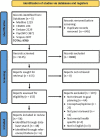Goal planning in mental health service delivery: A systematic integrative review
- PMID: 36601527
- PMCID: PMC9807176
- DOI: 10.3389/fpsyt.2022.1057915
Goal planning in mental health service delivery: A systematic integrative review
Abstract
Introduction: Goal planning is routinely employed in mental health service delivery to identify priorities for treatment and support the achievement and evaluation of outcomes. Previous systematic reviews of the literature have focused on the use of goal planning in a range of physical and cognitive disability settings, but there is a lack of information regarding how goal planning is used in mental healthcare.
Aims: This systematic integrative review aimed to understand the types of goals, effectiveness of goal planning, the experience of goal planning and barriers and facilitators to effective goal planning in mental healthcare settings.
Methods: Five databases were systematically searched using key terms related to mental health AND goal planning. The search was supplemented through citation chaining. Due to the heterogeneity of the studies, a narrative synthesis approach to data analysis was undertaken.
Results: Fifty-four studies were identified through the search of the literature following the PRISMA guidelines. Data was systematically extracted and thematically organized. There was a high level of heterogeneity among the studies, originating from a range of countries and with diverse characteristics and focus. Four themes emerged from the data analysis and included: (i) goal planning as a central aspect of interventions; (ii) types of goals planned; (iii) factors that influenced goal planning and/or attainment; and (iv) collaboration and concordance in goal planning.
Conclusion: This review found some support for the use of goal planning to improve outcomes in mental healthcare although there was no identified standardized approach to the use of goal planning. Individualized, recovery-oriented and collaborative goal planning was recommended but not always used in practice. Further research to understanding the most appropriate skills and training needed to support collaborative and effective goal planning is needed.
Systematic review registration: [https://www.crd.york.ac.uk/prospero/], identifier [CRD42020220595].
Keywords: goal planning; goal setting; mental health; mental illness; recovery planning; rehabilitation; systematic integrative review.
Copyright © 2022 Stewart, McMillan, Hu, Ng, El-Den, O’Reilly and Wheeler.
Conflict of interest statement
The authors declare that the research was conducted in the absence of any commercial or financial relationships that could be construed as a potential conflict of interest.
References
-
- McGuire A, Lysaker P, Wasmuth S. Altered self-experience and goal setting in severe mental Illness. Am J Psychiatr Rehabil. (2015) 18:333–62.
-
- Siegert R, Levack W. Rehabilitation Goal Setting: Theory, Practice and Evidence. Boca Raton, FL: CRC press, Taylor & Francis Group; (2015).
Publication types
LinkOut - more resources
Full Text Sources


